New Qantas chair tackles Alan Joyce ghosts of past to move airline forward
Qantas is soaring while conditions are good but when the cycle inevitably turns negative, this will test the airline’s commitment to changing its ways.
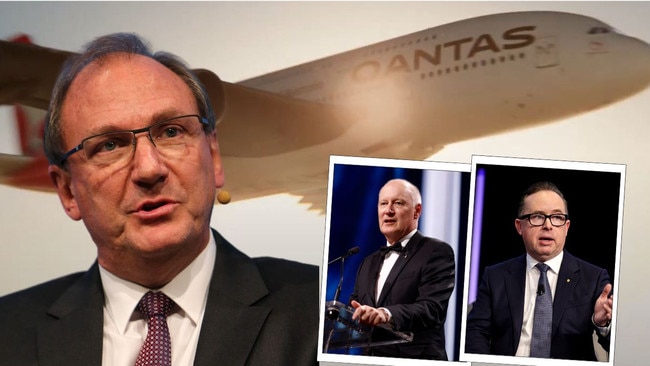
John Mullen wants to draw a line under the Qantas of last year.
However, to do this, the new Qantas chairman paid tribute to the two men responsible for the string of reputational hits, legal headaches and governance mistakes the airline now needs to work so hard to fix.
As the former chair of Telstra, Mullen has experience overseeing big brands that have faced immense reputational pressure. While it’s not unusual to highlight a former CEO under a previous chair – particularly one who left under a cloud – Mullen believes the only way to move forward is to recognise the past.
This was by calling out the contribution of former chief Alan Joyce and former chair Richard Goyder during his first formal meeting with shareholders.
Speaking at the airline’s annual meeting in Hobart on Friday, he pointed out Joyce’s 15-year tenure delivered many years of exceptional results. He also noted the former chair and CEO steered Qantas through the tough years of groundings during the Covid pandemic.
“Without their leadership, Qantas might well have not survived, and we might not all be here today,” Mullen said.
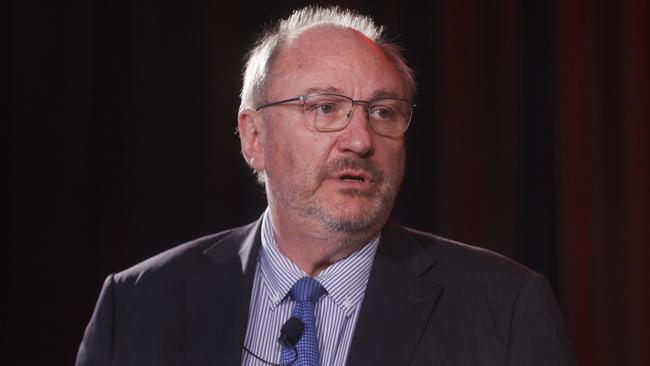
It’s some perspective on Joyce in particular. More sensational revelations about Joyce are expected in coming weeks, with a book set to be released examining his time at the airline. This will include Joyce’s close relationship with Anthony Albanese.
Mullen’s job now is to play the airline forward. And he used the annual meeting to lay out an ambition for Qantas to resume its place as “one of the truly great airlines of the world”. However, this aspiration could take years to fully realise.
Mullen and his chief executive Vanessa Hudson have been given the best possible starting point to drive the change agenda needed at Qantas.
The airline is through the worst both financially and reputationally and it is enjoying the warm glow from dozens of new aircraft arriving this year. More work needs to be done in lifting customer satisfaction, although measures have improved substantially from rock bottom over the year. On-time performance – a big driver of satisfaction – is improving as capacity and staffing levels improve.
And after years of heavy losses, the balance sheet has largely been repaired. Investors are enjoying a share price that is up 55 per cent since the last annual meeting, with shares now trading at a record high.
During Friday’s meeting, Qantas shares broke through the $8 barrier for the first time as it issued bullish first-quarter figures, underpinned by its discount Jetstar unit, lower fuel prices and strong broader demand for travel. This means the airline is mining cash and Hudson needs to move fast on winning back customers while the going is good.
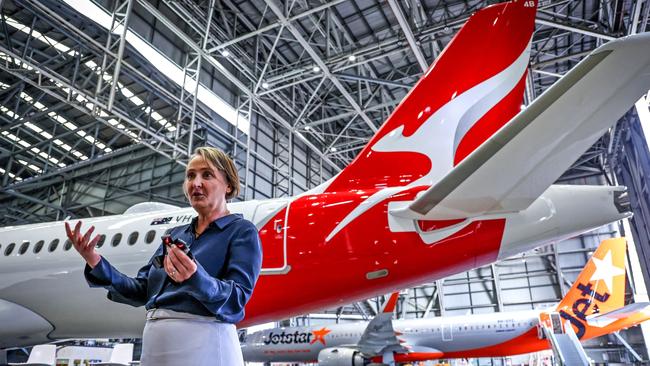
Elsewhere, there’s more spending on customers to come with a new refurbishment program outlined on Friday of the A330 fleet, which covers short-haul international and east coast to Perth flights. Even with industrial tensions still simmering, Qantas threw in a $1000 bonus to all non-executive staff. Compared to last year, shareholders and customers are happier.
After last year’s stinging rebuke from investors when the airline copped an 82 per cent protest vote against the remuneration report, at this year’s meeting it was comfortably supported – avoiding a damaging spill of the board positions.
The investor “no” vote on remuneration is still running around 14 per cent, showing there’s more work to be done to get the number back into the single digits. Mullen, however, won strong support from shareholders for his election as chair despite his heavy board workload outside Qantas. More board renewal is coming as Mullen stamps his authority on what is regarded as a trophy board in corporate Australia.
Mullen says Qantas should be in a position to start paying dividends again in the June half year, a symbolic moment that financially at least puts the pandemic totally behind it. Shareholders haven’t totally been left out during this period, Qantas has spent nearly $1.3bn on share buybacks over the past two years.
Great ambitions
Still, all this is going to be a balancing act for Qantas. Conditions are in its favour now, but when they inevitably turn negative this will be a test to see if Qantas has changed its ways. Mullen too acknowledged he won’t always get it right.
As Qantas tries to win over shareholders, customers and staff all at the same time, at any point one of these groups is going to feel like they’ve been left short-changed.
Unions are having their moment now. They have been emboldened by Qantas’ vulnerability of the past year and own goal of sacking baggage workers through the pandemic. Despite vocal protests – including by engineers on Friday – their window to push harder for higher wages is rapidly closing as the economy slows.
Mullen cautioned as much, setting the ground rules for future wage negotiations between staff and the airline. Qantas needs to generate “solid profits” to continually invest in staff and customers, new planes and growth opportunities, he says.
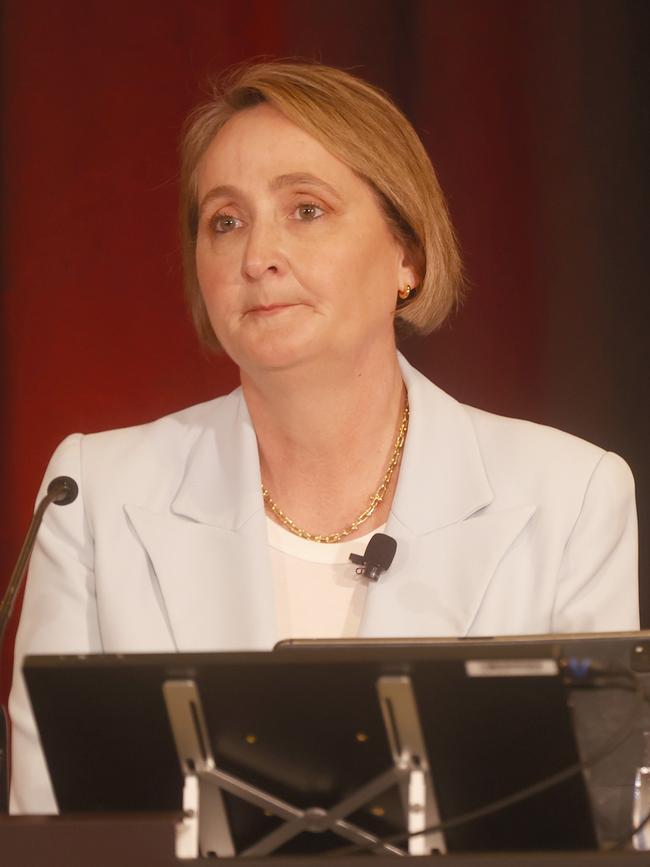
Other clouds on the horizon include how the Albanese government approaches the planned tie-up between rival Virgin Australia and Qatar Airlines. This is set to bring more international competition into Australia and this is where Qantas is most vulnerable, given the thinner profits that run on offshore routes.
Although Mullen hasn’t run an airline, he has been around the industry in one way or another his entire life.
Both parents were pilots, and his father flew with the Royal Air Force and later Ireland’s Aer Lingus. His executive career in logistics has also involved overseeing air fleet. What Mullen didn’t mention is he is a highly experienced sailor, a passion that has taken him to all corners of the world, including across some pretty rough oceans.
And it’s this experience that will be invaluable. Whether it’s in the air or on the ground, in aviation, conditions can change in an instant.
AI limits
The Bank of America chairman and CEO Brian Moynihan was briefly in Sydney this week marking the 60th anniversary of the bank’s operations here. He told the The Weekend Australian that artificial intelligence is already delivering real savings across BofA, which ranks as one of the biggest banks in the world. However, the challenge is to start scaling up the technology into new areas to make it more useful for customers.
The US banking giant has been experimenting with AI in various forms for more than a decade, including building its own virtual financial assistant called “Erica”. Since its official launch five years ago the assistant has had 2.5 billion regular interactions with tens of millions of the bank’s customers. Sitting behind Erica is powerful AI and machine learning technology.
Moynihan says it took four years to reach the first billion interactions over Erica and then a little over a year to hit the second billion.
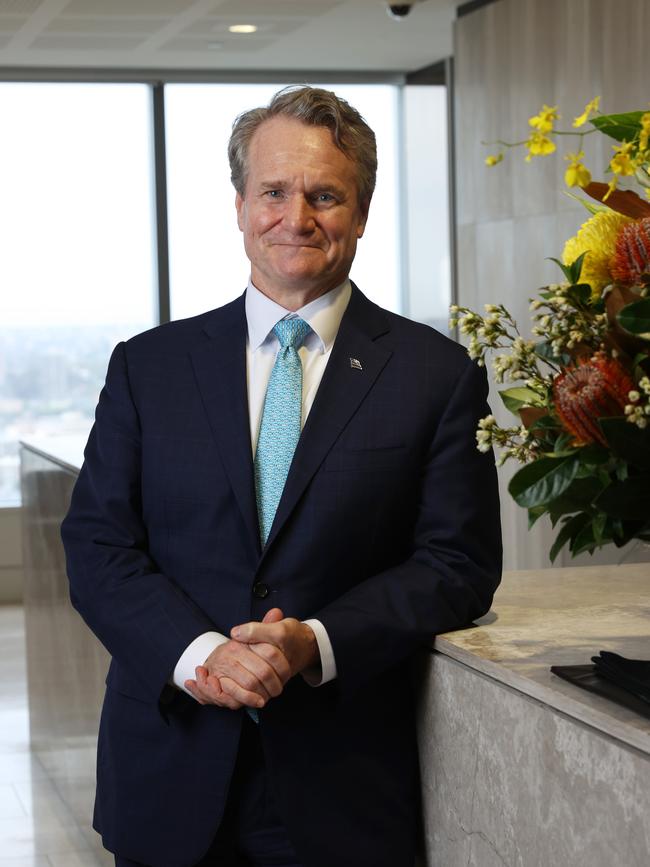
He says the total usage to date has saved the equivalent of 3000 years of work for an employee.
“All those things would have been a call, a branch, visit, an email, and now they’re being answered. The reality of it is, it is already saving lots of money at Bank of America. Two and a half billion interactions between a virtual assistant and a customer have already occurred. This isn’t like stuff of tomorrow. It’s today,” Moynihan says.
However he points out these AI interactions are still taking place in a “very controlled environment” and have to be done very carefully.
“The question is, can you get more capabilities that customers will use it for. And that’s the challenge. Can you be assured of that same outcome across more and more questions and make sure it’s the real thing. That’s the trick.”




To join the conversation, please log in. Don't have an account? Register
Join the conversation, you are commenting as Logout